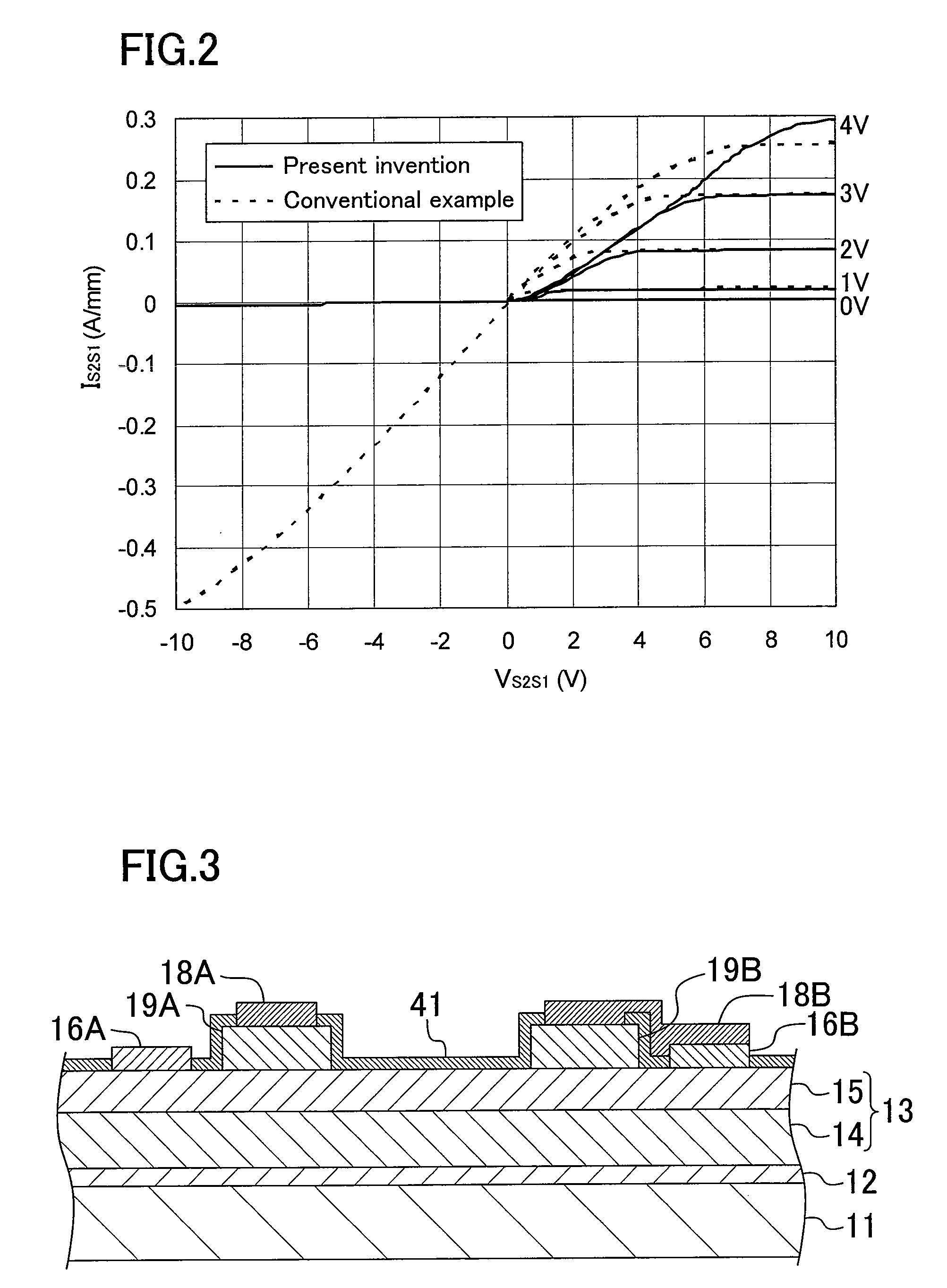Semiconductor device and method for driving the same
a technology of semiconductors and dielectric devices, applied in the direction of pulse generators, pulse techniques, electronic switching, etc., can solve the problems of difficult to obtain enhancement type characteristics and off types, and achieve excellent reverse voltage characteristics
- Summary
- Abstract
- Description
- Claims
- Application Information
AI Technical Summary
Benefits of technology
Problems solved by technology
Method used
Image
Examples
first embodiment
[0099]A first embodiment of the present invention will be described with reference to the drawings. FIG. 1 shows a cross section of a nitride semiconductor device according to the first embodiment of the present invention. As shown in FIG. 1, the semiconductor device of the present embodiment is a dual-gate semiconductor element. Specifically, a buffer layer 12 of AlN having a thickness of 100 nm is formed on a substrate 11 of sapphire in which the orientation of the principal plane is (0001), and a semiconductor layer stack 13 is formed thereon. The semiconductor layer stack 13 includes a first semiconductor layer 14 of undoped GaN having a thickness of 1 μm and a second semiconductor layer 15 of undoped Al0.15Ga0.85N having a thickness of 25 nm, which are formed in this order from the bottom.
[0100]A first electrode 16A and a second electrode 16B are formed from a stack of titanium (Ti) and aluminum (Al) so as to be spaced apart from each other on the second semiconductor layer 15,...
second embodiment
[0117]A second embodiment of the present invention will now be described with reference to the drawings. FIG. 4 shows a cross section of a semiconductor device of the second embodiment. In FIG. 4, like elements to those of FIG. 3 are denoted by like reference numerals and will not be further described below.
[0118]As shown in FIG. 4, the semiconductor device of the present embodiment includes a third semiconductor layer 17 of p-type doped Al0.2Ga0.8N having a thickness of 15 nm between the second semiconductor layer 15 and the first control layer 19A and the second control layer 19B.
[0119]The first control layer 19A and the second control layer 19R are typically formed by forming a nitride semiconductor layer of p-type GaN on the second semiconductor layer 15 and then selectively etching the p-type nitride semiconductor layer by dry etching using a chlorine gas, for example. However, it is very difficult to completely remove by etching only the p-type nitride semiconductor layer to b...
third embodiment
[0122]A third embodiment of the present invention will now be described with reference to the drawings. FIG. 5 shows a cross section of a semiconductor device of the third embodiment. In FIG. 5, like elements to those of FIG. 1 are denoted by like reference numerals and will not be further described below. As shown in FIG. 5, the semiconductor device of the present embodiment includes an integral electrode 16C of Ni on the second control layer 19B, wherein the integral electrode 16C is an integration of the second gate electrode and the second electrode.
[0123]FIG. 6 shows the VS2S1-IS2S1 characteristics of the semiconductor device of the present embodiment, in comparison with those of the conventional semiconductor device with no second control layer. In FIG. 6, VS2S1 is a voltage with respect to the first electrode 16A, and IS2S1 along the vertical axis is plotted assuming the positive direction is the direction of a current flow from the second electrode 16B toward the first elect...
PUM
 Login to View More
Login to View More Abstract
Description
Claims
Application Information
 Login to View More
Login to View More - R&D
- Intellectual Property
- Life Sciences
- Materials
- Tech Scout
- Unparalleled Data Quality
- Higher Quality Content
- 60% Fewer Hallucinations
Browse by: Latest US Patents, China's latest patents, Technical Efficacy Thesaurus, Application Domain, Technology Topic, Popular Technical Reports.
© 2025 PatSnap. All rights reserved.Legal|Privacy policy|Modern Slavery Act Transparency Statement|Sitemap|About US| Contact US: help@patsnap.com



